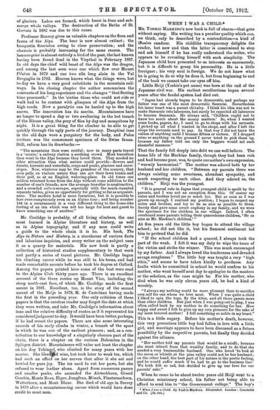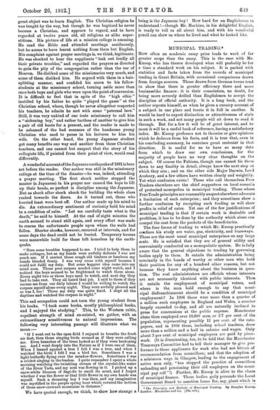WHEN I WAS A CHILD.* Mn. Yoanro MAILKINO'S new book
is full of charm—that goes without saying. His writing has a peculiar quality which can, we think, . only be described by a contradiction—a kind of illusive candour. His childlike transparency delights the reader, but now and then the latter is constrained to stop and ask himself if he has really understood the writer, who appears to be revealing himself with such simplicity. The Japanese child here presented to us interests us enormously, but it is difficult to grasp his personality. He is a little foreigner ; his very soul is foreign. We do not know what he is going to do or why he does it, but from beginning to end of the book we cannot take our eyes off him.
Little Heiji (Yoshio's pet name) was born at the end of the Japanese civil war. His earliest recollections began several years after the feudal system had died out.
"Japan had already begun to be democratic, and perhaps my father was one of the most democratic Samurai. Nevertheless his inner heart was a purest chivalry. I think his idea was not to make Samurais into labourers, but surely he expected all labourers to become Samurais. He always said, Children ought not to know too much about the money matters.' So, when I wanted some books, papers, &c., I used to go to shops with his servants. I picked up all what I wanted in the shops, and after I left the shops the servants used to pay. In that way I did not know the values of anything until I became fifteen or sixteen. If I dropped coins or anything on the ground I never tried to pick them up, because my father told me only the beggars would act such shameful manners."
That the family fell deeply into debt we can well believe. The home life of the Markin family, though they had been rich and had become poor, was, to quote ourauthor's own expression, " warmly harmonical." The mother was adored both by her husband and her children. "Between my parents there was always existing some sweetness, abundant sympathy, and much respecting to each other. And they adored us, the children." Heiji was the youngest.
"It is general rule in Japan that youngest child is spoilt by the parents, and I was not an exception from this. Of course my sister and brother loved me so much too. But as soon as I was grown up enough I realized my position; I began to respect my sister and brother, and try to be as nice as possible to them. Surely that gave some sweet euphony in my family, and we were the specimen for the children in our village. Indeed, I often overheard some parents telling their quarrelsome children, 'Be as nice as Mr. Markino's children.' "
At five years old the little boy began to attend the village school ; he did not like it, but his Samurai sentiment led him to pretend that he did.
"If the school children had a quarrel, I always took the part of the weak. I felt it was my duty to wipe the tears of the victim and strike the winner. This was much encouraged by my father. And I always loved the tenderness and dreaded savage roughness." The little boy was taught a very "high ethic," and seems to have taken kindly to goodness. Any faults which he committed in school he would confess to his mother, who went herself next day to apologize to the masters or the scholars, as the case might be. For his mother, who died. when he was only eleven years old, he had a kind of worship.
"I always say nothing could be more pleasant than to sacrifice own self for one whom we love most. When I was quite a child I liked to spin the tops, fly the kites, and all those games more than other children. But just when I was going out to play, I was often called back by my mother to do something for her. How happy and sweet I felt to give up my own pleasure for the sake of my most beloved mother I I felt something so noble in my heart."
This is a little sugary. Before his mother's death, however,
this very precocious little boy had fallen in love with a little girl, and marriage appears to have been discussed as a future
possibility by the respective parents, but finally they decided against the alliance.
"Her mother told my parents that would be a misfit; because she must inherit from that wealthy family, and to do that she needed a very businesslike husband. One who loved to look at the moon or whistle at the pine valley could not be her husband ; on the other hand, the best part of his nature is the poetic feeling, and he would suffer much if he had to go to the business line.' We both felt so sad, but decided to give up our love for our parents' sake."
When he came to be about twelve years old Heiji went to a Christian missionary school, his father not being able to afford to send him to " the Government college." The boy's
• When I was a Mild. By Yoshio Martino. Illustrated. London : Constable and Co. L6s..net.3
great object was to learn English. The Christian religion he was taught by the way, but though he was baptized he never became a Christian, and appears to regard, and to have regarded at twelve years old, all religions as alike super- stitions. His picture of life at a mission college is amusing. He read the Bible and attended meetings assiduously, but he seems to have learnt nothing from them but English. His complaint against prayer meetings is, we think, legitimate. He was shocked to hear the suppliants "leak out loudly all their private troubles," and regarded the prayers as directed to gain the pity of the congregation rather than the ear of Heaven. He disliked some of the missionaries very much, and some of them disliked him. He argued with them in a hair.
splitting manner, and confided his scorn to his fellow- students at the missionary school, turning aside more than once both boys and girls who were upon the point of conversion. It is difficult to feel that in spite of the " high ethic " instilled by his father he quite " played the game" at the Christian school, where, though he never altogether respected his teachers, he admits he met with some "paternal love."
Still, it was very unkind of one irate missionary to call him a "sickening boy," and rather tactless of another to give him a pair of old boots for a present, and the reader is made to be ashamed of the bad manners of the handsome young Christian who used to pause in his lectures to kiss his wife. On the other hand, the young Japanese student got many benefits one way and another from these Christian teachers, and one cannot but suspect that the story of his collegiate life, if painted from their point of view, would read differently.
A wonderful account of the Japanese earthquake of 1891 is here set before the reader. Our author was still in the missionary college at the time of the disaster—he was, indeed, attending
a prayer meeting. The first shock neither stopped the master (a Japanese) in his prayer nor caused the boys to lift
up their heads, so perfect is discipline among the Japanese. But as shock after shock shook the building the whole class rushed towards the doors. As it turned out, those who hurried least were best off. Our author made up his mind to die. An extraordinary sentiment of curiosity held his mind in a condition of calm. "Let me carefully taste what is the death," he said to himself. At the end of eight minutes the earth seemed to stand still again, and every effort was made to rescue the unfortunate people upon whom the walls had fallen. Shorter shocks, however, recurred at intervals, and for some days the dead could not be buried. Temporary houses were meanwhile built for those left homeless by the earth- quake.
"Here some troubles happened to me. I tried to help them to make cottages, but as my hands were awfully delicate I was not much use. If I carried those rough old timbers or bamboos my hands bleeded freely. I was very cross with myself because I could not fulfil my duty. But some happier idea came into my mind soon. Those poor corpses needed some night watch, and I noticed the boys seemed to be frightened to watch them alone. Every night two or three boys used to watch, and next day they had to take rest. They all hated that job. I said to them if they, excuse me from our daily labour I would be willing to watch the corpses myself alone every night. They were awfully pleased and so was I, too ! There my duty was quite fixed. I slept all the daytime and watched the corpses in night."
This sad occupation could not turn the young student from his books. "I took some books, mostly philosophical books, and I enjoyed the studying." This, to the Western critic,
repellent strength of mind co-existed, we gather, with an extraordinary sensitiveness to natural impressions. The following very interesting passage will illustrate what we mean :—
" If I went out to the open field I enjoyed to breathe the fresh air first, then those singing birds seemed as if they were calling me. Even branches of the trees looked as if they were beckoning me. And I went deeply into the Nature as if I were one of them. When I leaned against a tree I felt I was a tree, and when I watched the birds I felt I was a bird too. Sometimes I was a light butterfly flying over the meadow-flowers. Sometimes I was a cricket singing in the bushes. I quite remember I spent a whole morning watching the twinkling stream of the crystal-like water of the River Yada, and my soul was flowing in it. I picked up a snow-white blossom of Sagi-So to smell its scent, and I forgot whether I was the flower or that little flower in my own hands was myself. Such a dreaming boy I was then, and my imagination was mystified in the purple spring haze which covered the bottom of those snow-crowned mountains in distance."
We have quoted enough, we think, to show how strange a
being is the Japanese boy ! How bard for an Englishman to understand !-though Mr. Markino, in his delightful English, is ready to tell us all about him, and with his wonderful pencil can show us where he lived and what he looked like.



















































 Previous page
Previous page